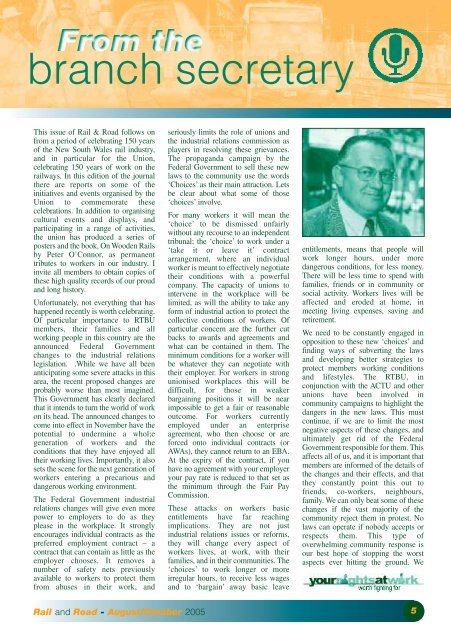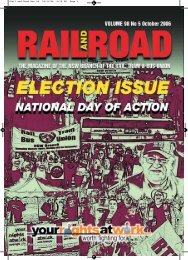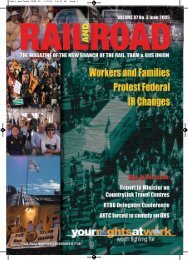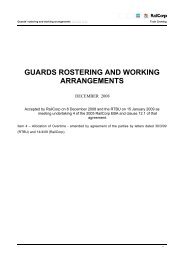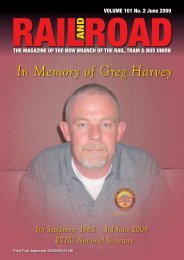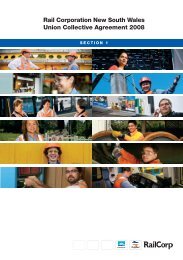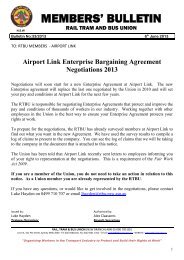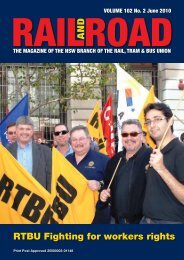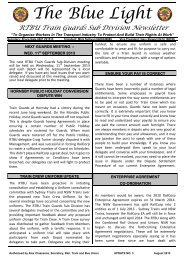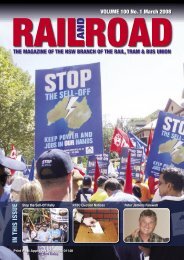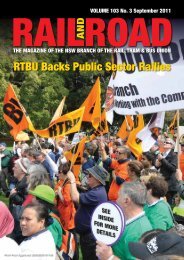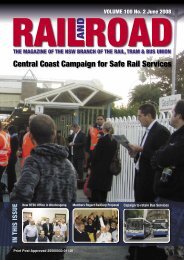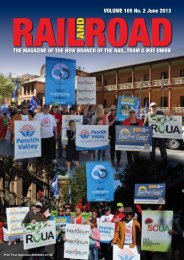Print Post Approved25500003-01148 - Rail, Tram and Bus Union of ...
Print Post Approved25500003-01148 - Rail, Tram and Bus Union of ...
Print Post Approved25500003-01148 - Rail, Tram and Bus Union of ...
You also want an ePaper? Increase the reach of your titles
YUMPU automatically turns print PDFs into web optimized ePapers that Google loves.
This issue <strong>of</strong> <strong>Rail</strong> & Road follows on<br />
from a period <strong>of</strong> celebrating 150 years<br />
<strong>of</strong> the New South Wales rail industry,<br />
<strong>and</strong> in particular for the <strong>Union</strong>,<br />
celebrating 150 years <strong>of</strong> work on the<br />
railways. In this edition <strong>of</strong> the journal<br />
there are reports on some <strong>of</strong> the<br />
initiatives <strong>and</strong> events organised by the<br />
<strong>Union</strong> to commemorate these<br />
celebrations. In addition to organising<br />
cultural events <strong>and</strong> displays, <strong>and</strong><br />
participating in a range <strong>of</strong> activities,<br />
the union has produced a series <strong>of</strong><br />
posters <strong>and</strong> the book, On Wooden <strong>Rail</strong>s<br />
by Peter O’Connor, as permanent<br />
tributes to workers in our industry. I<br />
invite all members to obtain copies <strong>of</strong><br />
these high quality records <strong>of</strong> our proud<br />
<strong>and</strong> long history.<br />
Unfortunately, not everything that has<br />
happened recently is worth celebrating.<br />
Of particular importance to RTBU<br />
members, their families <strong>and</strong> all<br />
working people in this country are the<br />
announced Federal Government<br />
changes to the industrial relations<br />
legislation. .While we have all been<br />
anticipating some severe attacks in this<br />
area, the recent proposed changes are<br />
probably worse than most imagined.<br />
This Government has clearly declared<br />
that it intends to turn the world <strong>of</strong> work<br />
on its head. The announced changes to<br />
come into effect in November have the<br />
potential to undermine a whol;e<br />
generation <strong>of</strong> workers <strong>and</strong> the<br />
conditions that they have enjoyed all<br />
their working lives. Importantly, it also<br />
sets the scene for the next generation <strong>of</strong><br />
workers entering a precarious <strong>and</strong><br />
dangerous working environment.<br />
The Federal Government industrial<br />
relations changes will give even more<br />
power to employers to do as they<br />
please in the workplace. It strongly<br />
encourages individual contracts as the<br />
preferred employment contract – a<br />
contract that can contain as little as the<br />
employer chooses. It removes a<br />
number <strong>of</strong> safety nets previously<br />
available to workers to protect them<br />
from abuses in their work, <strong>and</strong><br />
seriously limits the role <strong>of</strong> unions <strong>and</strong><br />
the industrial relations commission as<br />
players in resolving these grievances.<br />
The propag<strong>and</strong>a campaign by the<br />
Federal Government to sell these new<br />
laws to the community use the words<br />
‘Choices’ as their main attraction. Lets<br />
be clear about what some <strong>of</strong> those<br />
‘choices’ involve.<br />
For many workers it will mean the<br />
‘choice’ to be dismissed unfairly<br />
without any recourse to an independent<br />
tribunal; the ‘choice’ to work under a<br />
‘take it or leave it’ contract<br />
arrangement, where an individual<br />
worker is meant to effectively negotiate<br />
their conditions with a powerful<br />
company. The capacity <strong>of</strong> unions to<br />
intervene in the workplace will be<br />
limited, as will the ability to take any<br />
form <strong>of</strong> industrial action to protect the<br />
collective conditions <strong>of</strong> workers. Of<br />
particular concern are the further cut<br />
backs to awards <strong>and</strong> agreements <strong>and</strong><br />
what can be contained in them. The<br />
minimum conditions for a worker will<br />
be whatever they can negotiate with<br />
their employer. For workers in strong<br />
unionised workplaces this will be<br />
difficult, for those in weaker<br />
bargaining positions it will be near<br />
impossible to get a fair or reasonable<br />
outcome. For workers currently<br />
employed under an enterprise<br />
agreement, who then choose or are<br />
forced onto individual contracts (or<br />
AWAs), they cannot return to an EBA.<br />
At the expiry <strong>of</strong> the contract, if you<br />
have no agreement with your employer<br />
your pay rate is reduced to that set as<br />
the minimum through the Fair Pay<br />
Commission.<br />
These attacks on workers basic<br />
entitlements have far reaching<br />
implications. They are not just<br />
industrial relations issues or reforms,<br />
they will change every aspect <strong>of</strong><br />
workers lives, at work, with their<br />
families, <strong>and</strong> in their communities. The<br />
‘choices’ to work longer or more<br />
irregular hours, to receive less wages<br />
<strong>and</strong> to ‘bargain’ away basic leave<br />
entitlements, means that people will<br />
work longer hours, under more<br />
dangerous conditions, for less money.<br />
There will be less time to spend with<br />
families, friends or in community or<br />
social activity. Workers lives will be<br />
affected <strong>and</strong> eroded at home, in<br />
meeting living expenses, saving <strong>and</strong><br />
retirement.<br />
We need to be constantly engaged in<br />
opposition to these new ‘choices’ <strong>and</strong><br />
finding ways <strong>of</strong> subverting the laws<br />
<strong>and</strong> developing better strategies to<br />
protect members working conditions<br />
<strong>and</strong> lifestyles. The RTBU, in<br />
conjunction with the ACTU <strong>and</strong> other<br />
unions have been involved in<br />
community campaigns to highlight the<br />
dangers in the new laws. This must<br />
continue, if we are to limit the most<br />
negative aspects <strong>of</strong> these changes, <strong>and</strong><br />
ultimately get rid <strong>of</strong> the Federal<br />
Government responsible for them. This<br />
affects all <strong>of</strong> us, <strong>and</strong> it is important that<br />
members are informed <strong>of</strong> the details <strong>of</strong><br />
the changes <strong>and</strong> their effects, <strong>and</strong> that<br />
they constantly point this out to<br />
friends, co-workers, neighbours,<br />
family. We can only beat some <strong>of</strong> these<br />
changes if the vast majority <strong>of</strong> the<br />
community reject them in protest. No<br />
laws can operate if nobody accepts or<br />
respects them. This type <strong>of</strong><br />
overwhelming community response is<br />
our best hope <strong>of</strong> stopping the worst<br />
aspects ever hitting the ground. We<br />
<strong>Rail</strong> <strong>and</strong> Road - August/October 2005 5


